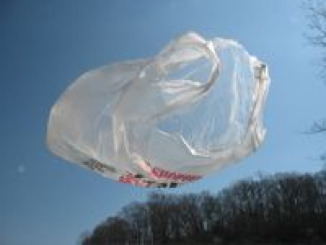 Wal-Mart Stores committed to reduce its global plastic shopping bag waste by an average of 33 percent per store by 2013. This is expected to eliminate more than 135 million pounds of plastic waste globally. To help reach this goal, Wal-Mart will reduce the number of bags given out by its stores, encourage the use of reusable bags and give customers the ability to continue recycling plastic shopping bags. The announcement was made at the Clinton Global Initiative Annual Meeting.
Wal-Mart Stores committed to reduce its global plastic shopping bag waste by an average of 33 percent per store by 2013. This is expected to eliminate more than 135 million pounds of plastic waste globally. To help reach this goal, Wal-Mart will reduce the number of bags given out by its stores, encourage the use of reusable bags and give customers the ability to continue recycling plastic shopping bags. The announcement was made at the Clinton Global Initiative Annual Meeting.
“By reducing the number of plastic bags our customers use while increasing recycling and the availability and affordability of reusable bags, we think we can eliminate plastic waste equivalent to 9 billion plastic bags per year from our existing stores alone,” said Matt Kistler, senior vice president for sustainability of Wal-Mart. “If we can encourage consumers to change their behavior, just one bag at a time, we believe real progress can be made toward our goal of creating zero waste.”
Wal-Mart’s comprehensive bag reduction strategy is being developed in partnership with Environmental Defense Fund (EDF). This goal could have far-reaching environmental and economic benefits. It is estimated that roughly 60-80 percent of all marine debris is plastic. Reducing plastic shopping bag waste could also help reduce government expenditures. For example, the state of California spends approximately $25 million per year to discard plastic bags into landfills.
“Plastic bags clog our landfills, litter our roadways, harm sea turtles and other wildlife, and gobble energy in production,” said Gwen Ruta, vice president for corporate partnerships at Environmental Defense Fund. “With this initiative, Wal-Mart is demonstrating that innovation leads to both business and environmental benefits I look to retailers everywhere to do the same.
Wal-Mart stores in Mexico and the U.S. are introducing new, more affordable reusable bags. Earlier this month, Wal-Mart de Mexico introduced reusable bags at one-third the cost of its current bags. In the U.S., Walmart will offer reusable bags beginning in October for 50 cents each.
Wal-Mart and its subsidiaries have the flexibility to meet this goal across the globe through a three-pronged strategy of reduce, reuse and recycle. Options for meeting the goal include, but are not limited to:
- Reduce: Decrease the amount of plastic going into our bags and also ensure bags are being loaded properly, reducing the number of plastic bags needed per trip to the store
- Reuse: Increase reusable bag use among our customers by making them accessible and affordable and educating customers on the benefits of reusable bags
- Recycle: Increase number of plastic bags being recycled.
A few examples of plastic shopping bag reduction initiatives already taking place in Wal-Mart’s global business include:
- South America: In the past two years, Argentina has seen a 20 percent reduction in plastic bag use through improved cashier training. In the past five years, Brazil has seen a 20 percent reduction in plastic bag usage through its “One More Item per Bag” program.
- Asia: In Japan, Seiyu began selling “replace for free” reusable bags in June 2007. As of September 2008, 46 percent of its customers now use their own bags. In China, Wal-Mart offers 15 types of reusable bags.
- Europe: ASDA has removed single use carrier bags from all of its checkouts. Since June 2008, ASDA has reduced the amount of plastic bags used in its stores by 30 percent.
- North America: Walmart estimates since October 2007, it has sold enough reusable bags in the U.S. to eliminate the need for one billion plastic bags. Wal-Mart Canada has reduced plastic bag waste by 15 percent in the last year by offering affordable reusable bags and improved recycling.
At last year’s Clinton Global Initiative Meeting Wal-Mart committed to transition the entire liquid laundry detergent category in its U.S. stores to concentrated detergent. They met the goal in May 2008 and served as a catalyst to transform this category across the retail industry. Within three years the transformation is expected to save more than 400 million gallons of water, 95 million pounds of plastic resin and more than 125 million pounds of cardboard.




















i like the idea; but, i can see stores collecting the reusable bags giving the customer a ticket and when you go to the register the customer gets ether a new bag or one that has been washed and the old bags that are no longer useable go in the recycle and if the customer forgets the bag they have to buy new ones, cut wast down by a lot i would thank…!!!
Just goes to show what a huge impact big corporations have on the planet…Let’s hope they continue to choose other POSITIVE ways to have such influence.
OK Walmart-time to start paying your people a living wage so that they won’t have to live on public assistance while working for you full time…Can you say BENEFITS?